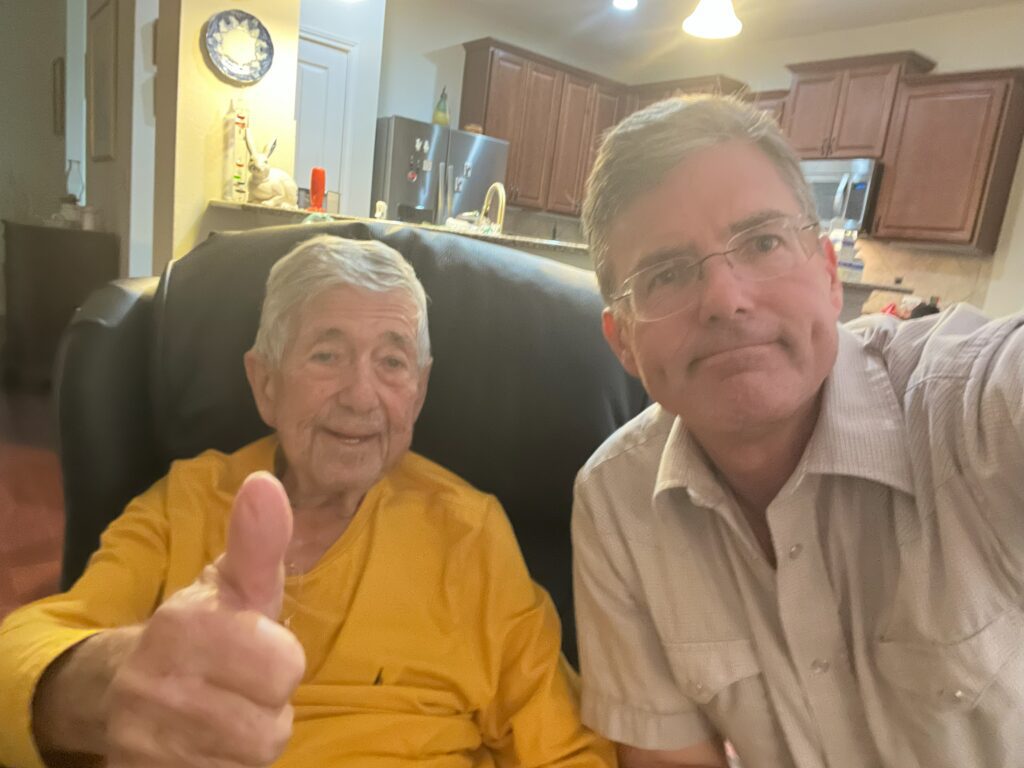
Dying
A remarkably kind, compassionate, and accessible oncologist, Dr. Brian Shimkus confirms what I already know.
My father is dying.
He has already expressed his wishes after having a lengthy surgery, radiation, and chemotherapy a year earlier. He does not want to go through that again if the cancer returns. It has returned with abandon, and I prepare myself for the difficult but sacred experience of telling him and my mom what Dr. Shimkus has confirmed.
Less than a week ago, we celebrated their 59th wedding anniversary, and my dad’s 81st birthday was just last month. We were suspicious that his cancer had returned as we, for several weeks, sought the reason for his back and pelvic pain.
Now, we know.
He has a few weeks to live.
My mom has been ill, too. She is still having diagnostic procedures and awaiting a diagnosis of her pulmonary condition, which her doctors discovered during a recent hospitalization.
The cliché turns out to be true. Life can change dramatically in the blink of an eye. I learned this seven years ago when I was diagnosed with Parkinson’s disease at age 48.
Living
Speaking with Mom the following day, she says that neither she nor my father slept well the night before, and, hoping they might nap, she asks me to delay my visit until the afternoon.
Three of my five bandmates—Rich, Charles, and Sam (Bobby and Lil couldn’t be there)—are practicing at Noon. I decide to join them. Calling ourselves “Dean’s List,” we are colleagues and friends, each serving as a dean at The University of Texas.
Friends provide a healing balm when one grieves. Having Parkinson’s taught me this.
After playing six or eight songs, I ask Rich, Sam, and Charles to record a rendition of “City of New Orleans” for my dad. It’s an Arlo Guthrie song that Willie Nelson also recorded. I offer to provide the vocals, which is remarkable given that I cannot sing.
But my dad likes this song. I fondly remember hearing it in our home and on the car radio as a child. I push through a cracking voice and a breaking heart as we perform the song.
The iPhone sitting atop the tall speaker records it all.
Thanking
Later that afternoon, after discussing my dad’s diagnosis with him and my mom and confirming his desire to forego treatment, he enters hospice care, a status marked by the delivery of a hospital bed that now sits in the living room, in front of his gigantic TV.
I sit beside him, with my mother, through days and nights.
His lovely and kind hospice nurse, Melissa, coaches us on his care.
Dr. Shimkus checks in periodically, too.
My parents’ minister visits, as do a few friends and family members.
In more private moments, my dad and I reminisce about our shared life, recalling youth league sports I played and some of the more exciting games and teams he coached. We speak of his professional career, of his accomplishments. I listen to him express a few regrets.
We talk about some of the friendships he has had and has, as well as friendships I had growing up and some I have now. My dad notes a few prized possessions he wants to ensure I have upon his death, mainly several military medals that belonged to his father.
We also speak of his deep love and affection for my mother and for Holly and Meredith, his beloved granddaughters, and Tracey, his daughter-in-law of 31 years, whom he also loves dearly.
We share our feelings for one another, using words like proud, grateful, and love.
I tell him how much I will miss him, that he’s been a faithful and good father, that he would be my hero forever.
I wash and shave his face and scratch his itchy places.
We sing his favorite hymns.
Occasionally, I bring him a few mini-sized Butterfingers, his drug of choice.
My mother smiles, and we give each other periodic hugs.
We sit quietly together.
We laugh.
We cry.
Milton said, “Gratitude bestows reverence…changing forever how we experience life and the world.”
I cue the video that Rich, Charles, Sam, and I made for my dad to play on his giant TV.
Together, we sing “City of New Orleans.”
__________
Allan Cole is Dean of the Steve Hicks School of Social Work at The University of Texas at Austin, where he also serves as the Bert Kruger Smith Centennial Professor in Social Work and, by courtesy, as Professor of Psychiatry and Behavioral Sciences at the Dell Medical School. Diagnosed with Parkinson’s in 2016 at the age of 48, he is the author or editor of 15 books on a range of topics related to chronic illness, bereavement, anxiety, and spirituality. His latest books are Jumping to the Skies: Additional Lessons from Parkinson’s Disease (Cascade, 2023) and Riding the Wave: Poems (Resource Publications, 0ff-press soon). Other recent books include Discerning the Way: Lessons from Parkinson’s Disease (Cascade), In the Care of Plenty: Poems (Resource Publications), and Counseling Persons with Parkinson’s Disease (Oxford University Press). With filmmaker and his creative partner Vanessa Reiser, his documentary titled “The Only Day We Have” will air in February of 2024 on PBS. Follow him on Instagram @allancoleatx.
